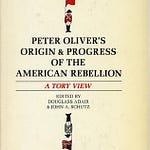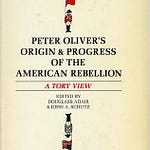Here is the next chapter in Peter Oliver’s tory view of the American rebellion. This chapter is a deep dive into the character of a handful of Massachusetts Bay Colony men who were integral to the beginning of the revolution. Oliver caveats the chapter well to make clear that his perspective may not align with other more widely accepted views. He asserts that his personal knowledge of the men involved and the events related give him the latitude to depart from the Narrative, and I am inclined to agree.
Every student of history, armchair or otherwise, is forced to contend with the Primary Source Question: should I trust this guy just because he was there? Imagine reading the recollections of some box-wine besotted liberal spinster documenting “The Trump Years.” Imagine reading an American jew’s perspective of the Global War on Terror. It’s not that there wouldn’t be interesting analyses or engaging thoughts with which to contend, rather one would always be on guard for manipulations, infelicities, and projection. But this is always the case, regardless of the source. It’s not that I would outright discount a Palestinian’s recollections of life in the West Bank, but I would endeavor to keep it contextualized with information gleaned elsewhere from parties and perspectives more insulated form the completely understandable emotions attendant.
A big reason why I am pouring so much time into this free project is because I think there is incalculable value in Oliver’s perspective of these events that have been so thoroughly mythologized by American culture1. One of my favorite troll-grenade comments to lob at Americanists is “the founding fathers where the Antifa of the American Colonies.” There is a measure of truth to this, at least pertaining to some of those rapscallions, but it’s less about accuracy and more about tactical contemplation: if I am wrong, how would you prove it?
“My teachers said they were the good guys!” The same teachers that believe real Marxism hasn’t even been tried yet?
“My Dad taught me that George Washington was the father of our country!” Is that the same boomer that believes Israel is our greatest ally?
And so it often goes.
I hate Howard Zinn. I think he did great damage to our culture, I think he caries an immense amount of responsibility for the horrifically stagnant state of the Academe, and I earnestly look forward to pissing on his legacy for the rest of my life2. Likewise, I can’t think of a single postmodernist revisionist I don’t revile. But my contempt is based on what they did with their revisionism, not that they sought to revise. They had their idol (Russian Communism) smashed publicly and overnight with the atrocities of Stalin admitted to and disavowed, and forever afterwards sought restore the image of communism in the hearts of the American Elite. They had no positive argument to stand on, so their only option was to attack the shared mythology of America.
I think revisionism can be a useful tool deployed for productive purposes. But it must be acknowledged as dangerous, and the purposes must be explicitly stated, as opposed to occluded behind handwaving and/or ad hominem.
To wit: I think we need to review the American Revolution by examining the perspective of the Royalists because we are in the eve of another monumental Turning. I think there are lessons to be learned, pitfalls to be avoided, and outcomes to be pursued.
But leave aside all this hifalutin posturing; Oliver’s account is just plain fascinating. His perspective on Samuel Adams fell on me like a bolt form the blue:
“The other [Adams] had always a religious Mask ready for his Occasions; he could transform his self into an Angel of Light with the weak Reliogionist; & with the abandoned he would disrobe his self & appear with his cloven Foot & his native Blackness of Darkness - he had a good Voice, & was a Master in vocal Musick.”3
If you are wondering, yes, this is about the beer guy. Oliver works hard to paint Adams as the literal devil, and subsequent chapters will demonstrate precisely why. This is a side note, but I find the phrase “transform his self” incredibly fascinating. It may just be the prose habits of the day, but the treating of the “self” as a distinct thing unto itself, as opposed to “himself,” creates a bridge of analytical understanding between my mind and this long dead aristocrat that has left me forever altered.
Anyway, I hope you all take the time to listen, and maybe even purchase a copy and dig in yourselves.
I know there are mispronunciations and other errors; I apologize profusely.
Reagan, too.
Oliver, Origins & Progress, Chap. II, pg 41




Share this post